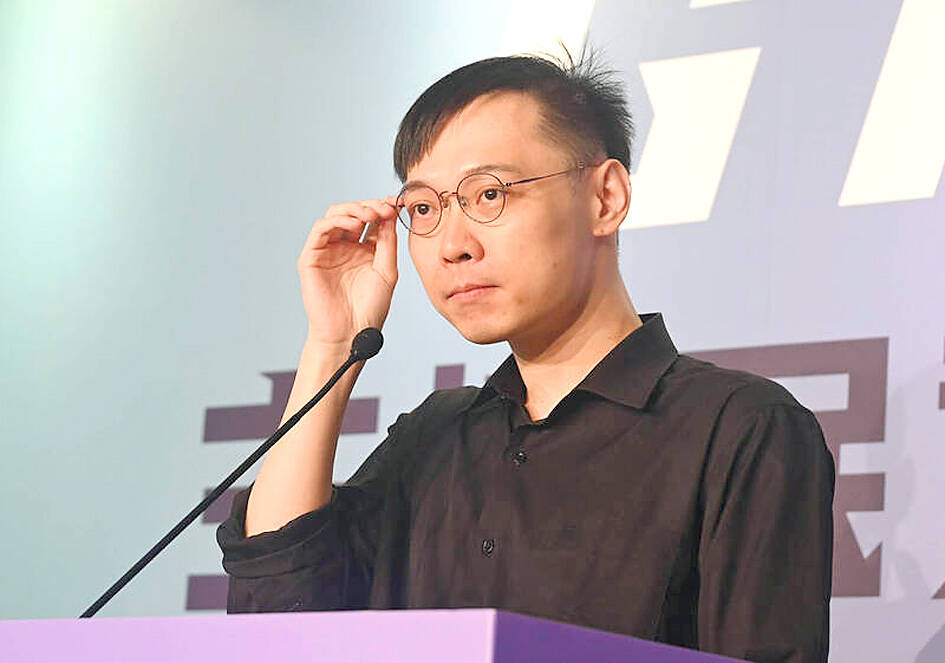A spokesperson for independent presidential candidate Terry Gou (郭台銘) on Friday dismissed allegations of signature buying, saying that prosecutors investigating the claims could confirm that the sites where the alleged irregularities occurred were not official Gou campaign offices.
Huang Shih-hsiu (黃士修) said that the Gou campaign has repeatedly told the third-party companies it works with to observe all laws regarding signature drives.
Several people have been questioned by prosecutors on suspicion of purchasing personal information to use in Gou’s signature drive to appear on next year’s presidential ballot.

Photo: Taipei Times file
On Thursday, the Kaohsiung District Prosecutors’ Office had 19 people arrested for suspected signature-buying for the Gou campaign.
Among them was Democratic Progressive Party (DPP) Kaohsiung chapter member Tseng Jui-han (曾睿涵), who was later released on NT$300,000 bail.
DPP spokesman Chang Chih-hao (張志豪) said the incident did not involve the party, adding that party members who contravene the law must face consequences and their party membership would be revoked for breaching party regulations.
DPP Kaohsiung chapter head Hsu Chih-shan (許智善) said that if the allegations against Tseng were proven, Tseng would no longer be a member of the DPP.
Another person arrested on Thursday, also surnamed Tseng (曾), allegedly had more than 10 signatures on her person.
Gou, the founder of Hon Hai Precision Industry Co, needs the signatures of 289,667 people, or 5 percent of eligible voters in the 2020 presidential election, by Thursday. They must then pass a review by the Central Election Commission to have his name included on the presidential ballot.
Gou on Oct. 6 announced that he has collected enough signatures to run in the January presidential election as an independent.
The results of the petitions are to be announced by the election commission on Nov. 14.
Additional reporting Ko You-hao, Chen Cheng-yu and CNA

An undersea cable to Penghu County has been severed, the Ministry of Digital Affairs said today, with a Chinese-funded ship suspected of being responsible. It comes just a month after a Chinese ship was suspected of severing an undersea cable north of Keelung Harbor. The National Communications and Cyber Security Center received a report at 3:03am today from Chunghwa Telecom that the No. 3 cable from Taiwan to Penghu was severed 14.7km off the coast of Tainan, the Ministry of Digital Affairs said. The Coast Guard Administration (CGA) upon receiving a report from Chunghwa Telecom began to monitor the Togolese-flagged Hong Tai (宏泰)

A cat named Mikan (蜜柑) has brought in revenue of more than NT$10 million (US$305,390) for the Kaohsiung MRT last year. Mikan, born on April 4, 2020, was a stray cat before being adopted by personnel of Kaohsiung MRT’s Ciaotou Sugar Refinery Station. Mikan was named after a Japanese term for mandarin orange due to his color and because he looks like an orange when curled up. He was named “station master” of Ciaotou Sugar Refinery Station in September 2020, and has since become famous. With Kaohsiung MRT’s branding, along with the release of a set of cultural and creative products, station master Mikan

RISING TOURISM: A survey showed that tourist visits increased by 35 percent last year, while newly created attractions contributed almost half of the growth Changhua County’s Lukang Old Street (鹿港老街) and its surrounding historical area clinched first place among Taiwan’s most successful tourist attractions last year, while no location in eastern Taiwan achieved a spot in the top 20 list, the Tourism Administration said. The listing was created by the Tourism Administration’s Forward-looking Tourism Policy Research office. Last year, the Lukang Old Street and its surrounding area had 17.3 million visitors, more than the 16 million visitors for the Wenhua Road Night Market (文化路夜市) in Chiayi City and 14.5 million visitors at Tainan’s Anping (安平) historical area, it said. The Taipei 101 skyscraper and its environs —

Taiwan on Friday said a New Zealand hamburger restaurant has apologized for a racist remark to a Taiwanese customer after reports that it had first apologized to China sparked outrage in Taiwan. An image posted on Threads by a Taiwanese who ate at Fergburger in Queenstown showed that their receipt dated Sunday last week included the words “Ching Chang,” a racial slur. The Chinese Consulate-General in Christchurch in a statement on Thursday said it had received and accepted an apology from the restaurant over the incident. The comment triggered an online furor among Taiwanese who saw it as an insult to the